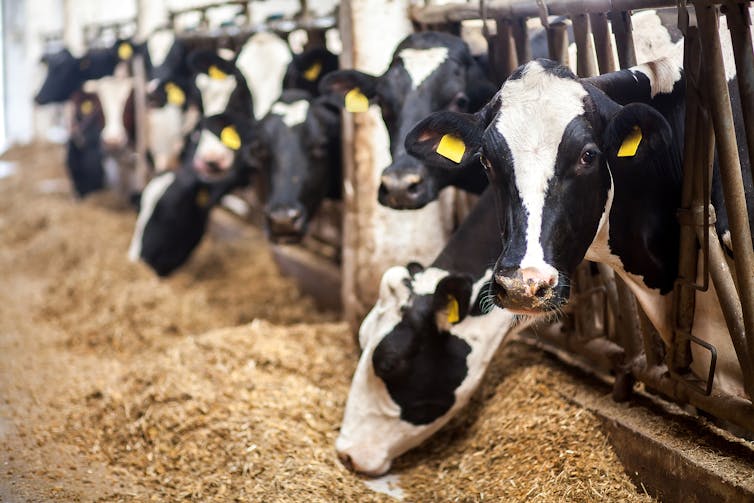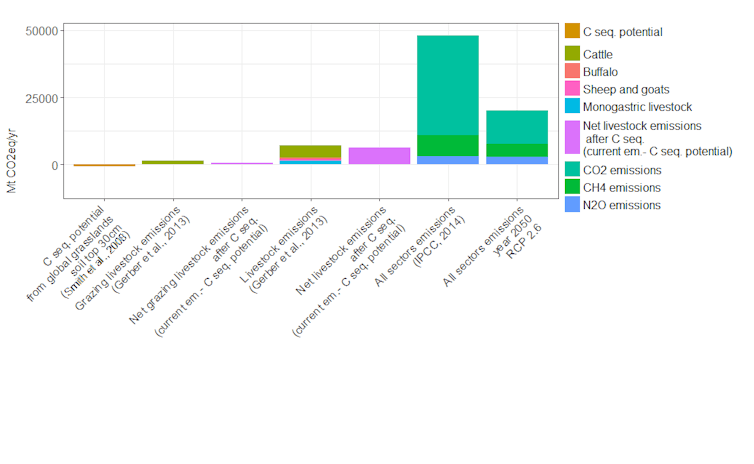Benefits of Grass Fed Beef on Environment
Beef gets a bad printing, environmentally speaking. We're bombarded with reports highlighting its high carbon footprint accompanied past images of belching cows and devastated rainforests.
But is all beef bad? Some contend that beef from grass-fed cows has college welfare, nutrition and other credentials than meat from animals that consume intensively farmed, high-protein feeds. Nearly cattle get a mixture of such feeds and grass. Many also fence that purely grass-fed cows non merely produce less emissions than those fed soy or grain, simply that they tin can fifty-fifty help blot carbon from the atmosphere (grass uses up carbon from the air via photosynthesis). My colleagues and I have produced a new study for the Nutrient Climate Enquiry Network that shows the evidence suggests otherwise.
Most studies conclude that if yous wait at the amount of land used and greenhouse gas emissions produced per kilogram of meat, pasture-based cattle really accept a greater climate bear upon than animals fed grains and soy. This is because commercial feeds tend to exist less gristly than grass, then cows that eat them produce less methane (through belching and flatulence), which is a potent greenhouse gas. Animals in more intensive, grain-fed systems systems also reach slaughter weight faster than grass-fed animals practise, and so emissions over the animal'due south entire lifetime are lower.

However, some academics and many within the alternative farming motion challenge these conclusions. They say that these studies just factor in one side of the greenhouse gas emissions equation: the animals' emissions. Inspired past ideas such as ecologist and farmer Allan Savory's principles of "holistic grazing management", they argue that if yous graze cattle in the right way, their nibbling and trampling actions can actually stimulate the grass to put downwardly deep roots and actively remove carbon from the temper. This is plausible under certain circumstances, which is why we considered it in our report.
Some even contend that the corporeality of carbon removed past this blazon of grazing tin can actually exceed the cattle's total emissions. In other words, they should be seen every bit an essential function of the climate solution.
Advocates of grass-fed cows as well point out that marsh gas gets broken down in the temper after about 12 years, and then it's only a temporary problem. These and other arguments are even leading to moves to award carbon credits to grazing initiatives.
The evidence
So are these claims justified? Nosotros decided to sift through the evidence to find out. We recognised that the grass-fed issue is about multiple social, ethical and ecology concerns but we decided to focus on only one business concern: climate modify. We asked ane question: what is the net climate touch on of grass-fed ruminants, taking into account all greenhouse gas emissions and removals?
We institute that well-managed grazing in some contexts – the climate, soils and management authorities all have to be right – can cause some carbon to exist sequestered in soils. Only, the maximum global potential (using generous assumptions) would get-go simply 20%-60% of emissions from grazing cattle, four%-xi% of total livestock emissions, and 0.6%-1.6% of total annual greenhouse gas emissions.

In other words, grazing livestock – fifty-fifty in a best-case scenario – are internet contributors to the climate problem, every bit are all livestock. Skillful grazing management cannot start its own emissions, let lone those arising from other systems of animal production.
What's more, soils being farmed using a new organisation of management, such as grazing, reach carbon equilibrium, where the carbon that flows into soils equal carbon flows out, inside a few decades. This means that any benefits from grass-fed cows are time-limited, while the problems of methane and other gases go along for equally long as the livestock remain on the land. Plus, a change in management or climate – or even a drought – can overturn any gains.
Equally for methane, the argument that its impact is temporary then non of import is flawed. While the warming effect of any given pulse of methane is temporary, the full warming impacts volition continue for every bit long as the source of methyl hydride continues. Methane will be emitted and go on to warm the planet as long as cattle are still reared. The problem but disappears if ruminant production is abandoned.
How we employ land is also changing, which poses new challenges. Grazing ruminants have historically driven deforestation and the carbon dioxide emissions associated with it. But today, demand for soy and grains to feed pigs, poultry, and intensively reared cattle poses a new threat. This drives the conversion of grassland to abound such grains and the release of carbon stored in it.
That said, ruminants are notwithstanding implicated. Forests are still cut down while grasslands are being intensified to support more livestock farming. This means using fertilisers or planting legumes, which cause nitrous oxide emissions, on summit of the methane the animals produce. In other words, whatever the system and animal type, ascent animal production and consumption is driving damaging changes in country use and associated release of greenhouse gases.
The priority for now and coming years is to figure out the least bad environmental way of using land and other resource to feed ourselves and run into our other developmental goals. We need to question the common assumption that high levels of consumption in affluent countries, and speedily ascent demand in developing countries, are inevitable. The more that demand for meat increases, the harder information technology will be to tackle our climatic and other environmental challenges.
Source: https://theconversation.com/why-eating-grass-fed-beef-isnt-going-to-help-fight-climate-change-84237
0 Response to "Benefits of Grass Fed Beef on Environment"
Post a Comment